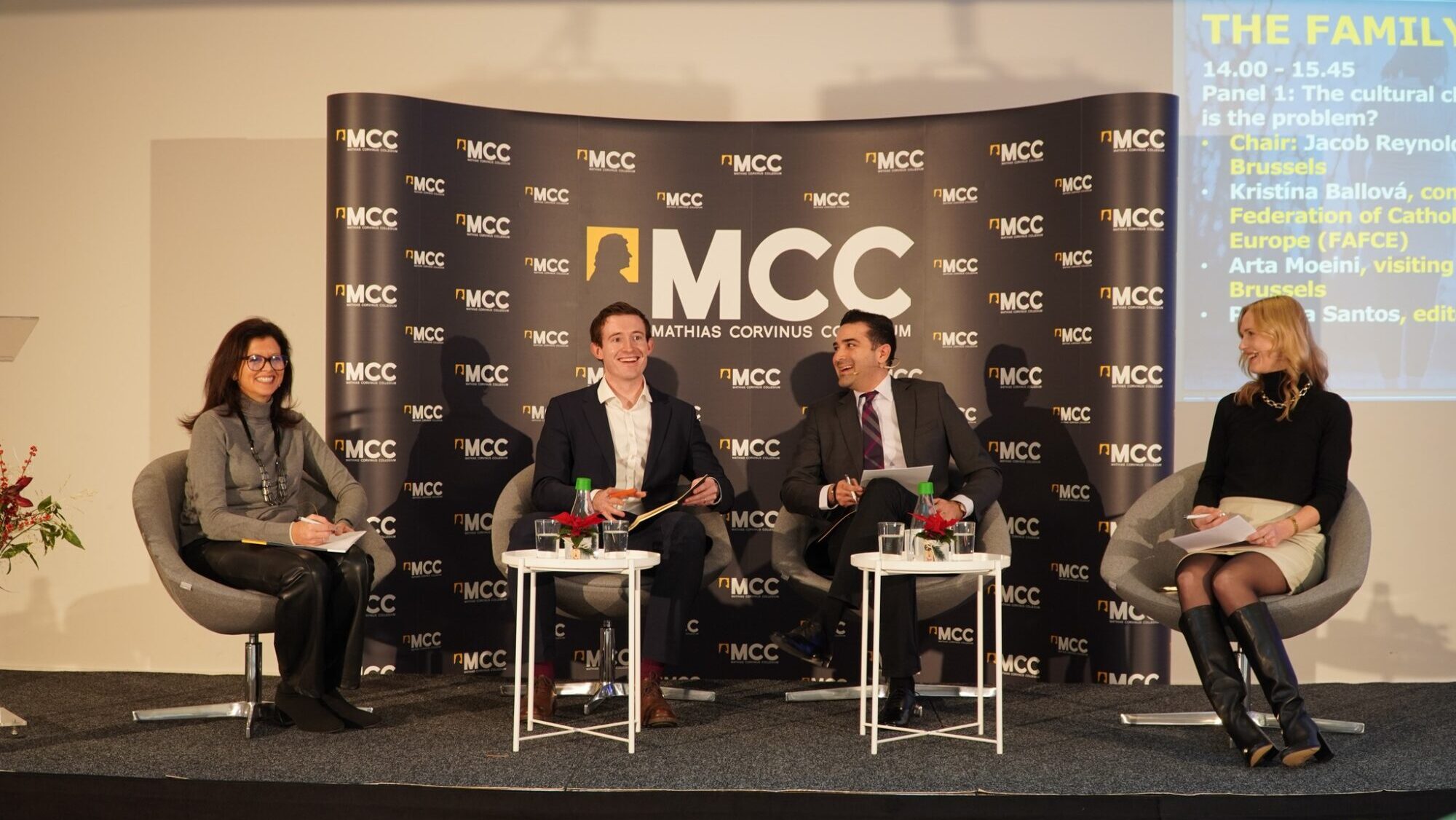
Patricia Santos, Jacob Reynolds, Arta Moeini, and Kristina Ballová
Photo: MCC Brussels / Facebook 11 December, 2023.
Concerns about the survival of the family in the modern world were the subject of MCC Brussels’ conference on Thursday, December 7th, entitled “The family in crisis.”
“Throughout most of the modern era, the idea that the family, in its conventional nuclear form, which served as a foundational institution of society in the West, was rarely challenged. Yet today, this institution and the ideals associated with it are frequently decried and described as outdated, discriminatory and oppressive,” according to Professor Frank Füredi, executive director of MCC Brussels—and author of this recent essay—as he set out the problem posed today by ‘Californian Values.’
In his speech to the conference, Füredi said that the cultural pressures of the modern era depict family, pregnancy, and parents as societal problems. “A problem family used to be a family where the husband was absent, where the wife was feeling overwhelmed. They were so poor they couldn’t make ends meet. These families were in a minority,” the professor recalled of his early career in the social sciences in the 1970s. Before long, the social workers of the time—a profession increasingly staffed by sociology graduates—went from trying to keep a family together to trying to save a child from its parents. By the 1990s, an expression, “the dark side of the family” entered routine use, with stories of domestic violence and child abuse. This gradually fuelled total mistrust of the family, Füredi explained.
“Because the family is portrayed as a dark place, there is an incentive for experts, professionals, governments, and bureaucrats to make up for the parental family deficit. A family becomes a landscape that they invade, put their noses in, and it makes it difficult for families to flourish,” Füredi continued, adding that Western culture particularly adheres to so-called ‘Californian values,’ a culture that is entirely hostile to the family. In this context, the professor also discussed the problem of the authority of adults being marginalised and children being empowered through children’s rights.
The professor gave two concrete examples of families being endangered. In Scotland “the parents have no right to know what kind of sex education their children are getting. They are indoctrinating our children behind our backs.” In the Republic of Ireland, a referendum was announced seeking to modify the constitution to contain gender-neutral language. If passed, the document will change the definition of the family, making it either “founded on marriage or on other durable relationships.” According to Füredi, the referendum “captures the dominant zeitgeist in the way families are perceived within Western societies.”
European institutions also play a significant part in how families are perceived. Conference speaker Margarita de la Pisa Carrión MEP—of Spanish conservatives VOX—talked about how the left-liberal majority in the European Parliament tries to avoid discussing families altogether, with established definitions such as ‘mother’ being replaced by the neutral ‘caregiver’. She was joined by Croatian Sovereignist MEP Ladislav Ilčić, who said that the language in the Parliament revolves around human rights, where the wishes of the individual are more important than the institutions of marriage and family.
Individualism was widely debated at the conference, with some participants blaming the culture of individualism for dismantling families, while others argued that strong families create strong individuals, which in itself is not a problem.
Political theorist Arta Moeini, researcher at MCC Brussels talked about traditional family as the bedrock of society, claiming that modernity and individualism are inimical to the traditional family. In modern society, women feel they have to choose between family, motherhood, and their personal ambitions, while the desire to have children keeps getting compared to the monetary benefits of having a family. Patricia Santos, editor-in-chief of the Spanish conservative magazine El Debate, surprised the audience by pointing out that when one compares what it costs to live in a family—to provide for most of one’s needs within the family—to outsourcing those costs on a market basis, the average European family can save €170,000 a year. The bigger the family, the greater the economic benefits for its members.
Kristína Ballová, communications officer at the Federation of Catholic Family Organisations (FAFCE), also pointed out that nowadays the family is often portrayed as a prison, and motherhood cannot be talked about in a positive way without inviting further criticism. Such pressures help to explain why 80% of European women graduates are childless at the age of 30, alongside the social problems of mental illness and loneliness. Kinga Joó, vice-president of the Hungarian National Association of Large Families said that recent studies on values and public wellbeing confirm that the institution of family is very important for Europeans and—if this is true— there should be more trust and investment in families by decision-makers. However, the EU rarely sees the family as a solution to the problem of demographic decline. She emphasised that Hungary has prioritised the family, given incentives and state benefits to those wishing to have more children, and has had a ministry for family affairs earlier than most member states.
While the future of the family in Europe remains a contentious issue, the conference set an important maker by making a conservative case for defending the institution.
